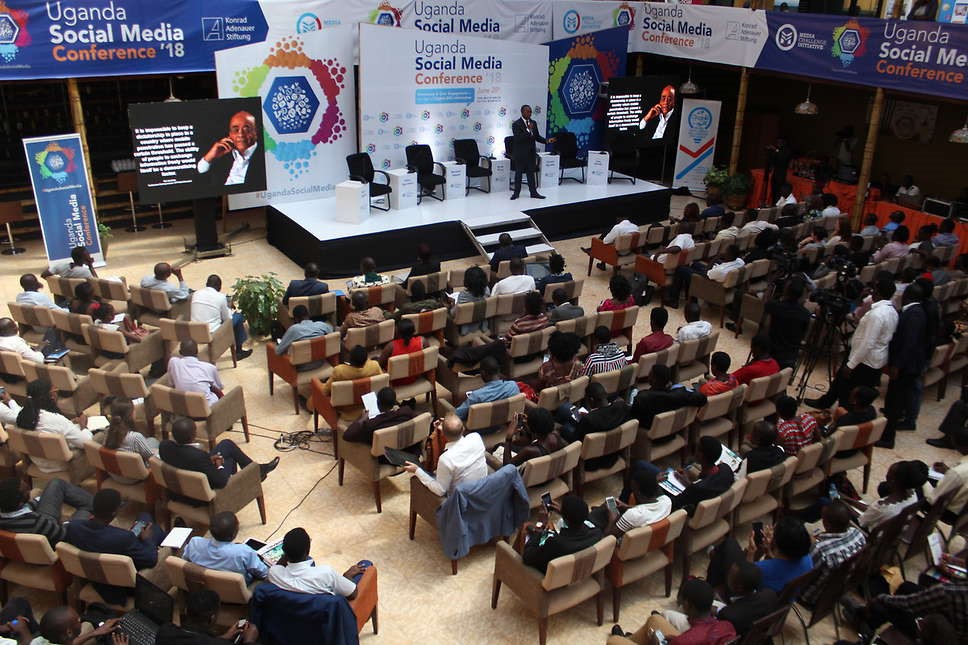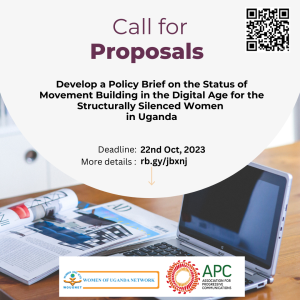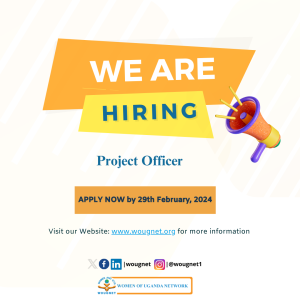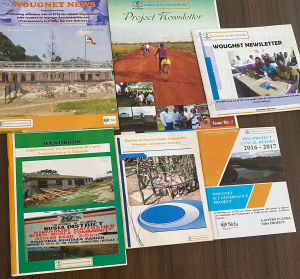The Uganda Social Media Conference is an annual event organized by the Uganda country office of the Konrad-Adenauer-Stiftung (KAS). It aims at bringing together key stakeholders from government, civil society, academia, and the media to have a constructive exchange on the impact of social media on the state and society, highlighting both opportunities and challenges. The conference provides a unique platform for theorizing, dialoguing, and engaging on how the growing relevance of social media shapes our social and political interactions and changes the way we access and process information.
The first-ever public social media conference took place in July 2015 that prioritized the discourse on social media as a tool for political engagement in Uganda.
On Thursday, June 28, 2018, the fourth edition of Uganda’s largest Social Media Conference was convened at Mackinnon Suites, Kampala under the theme “Democracy and Civic Engagement in the Age of Digital (Dis) Information”. It focused on digital information or rather disinformation and how it shapes public perceptions, opinions, behaviors, and its impact on political processes. This provided a unique opportunity for deepening and expanding the discussions and exploring new perspectives.
This year’s conference was the first ever unique of its kind, the morning session started with 3 parallel workshops followed by very insightful speeches, panel discussions, and a range of debates.
WOUGNET had the opportunity to attend one of the 3 parallel sessions on “Understanding and countering social media hate speech” which was conducted by John Ja Dak (Executive Director of the Youth Social Advocacy Team (YSAT). He defined hate speech as speech that attacks a person or group of persons on the basis of gender, race, religion, disability, origin, nationality, and others. “Any information you pass that hurts another person is hate speech,” he said. He supplemented that dangerous speech is a subject of hate speech that can catalyze mass violence. This can be in form of messages, audience, context, and medium for instance if a message is against a certain group of people, then it is dangerous speech. Participants suggested that Hate speech can be referred to as false information. The hate speech pyramid consists of Genocide, Bias-motivational violence, discrimination, individual acts of prejudice, and bias.
Hate speech can be propagated through posting on online platforms such as Facebook, Twitter and among others. For instance, words used in Sudan to incite violence in a community include; Nyagat (robbery) which means traitor, defector, and sellout. Jenge is used by Neur or Equatorials and this degrades Dinkas associating them with cattle. Online hate speech incites offline violence through propaganda, rumor, fake news, and mass violence.
The German-South Sudanese initiative #defyhatenow discussed ways to respond to and mitigate hate speech attacks such as; verifying the context, speaking up, reporting hate speech, creating awareness on offline and online hate speech, creating hashtags for instance #DefyHateNow, being consistent and conducting training on hate speech. Currently, hate speech can be reported on www.facebook.com/help
There are insufficient legal and regulatory frameworks because internet users are not controlling what is posted online and tech companies have reactive policies addressing hate speech.
The suggested remedies to reduce fake news are to evolve our thinking approach and lenses, regulate and protect freedom of speech and also strengthen professionalism in the newsrooms. However, Facebook has started working with independent organizations such as Facts Check organizations to reduce fake news because the platform faced a lot of pressure on fake news.
Facts that You May Not Know
- The top 10 most visited websites in Uganda are: google.com, youtube.com, Facebook.com, yahoo.com, myway.com, Twitter.com, flashscore.com, wikipedia.org, xvideos.com, and ura.go.ug.
- WhatsApp most dangerous words are “Sent as Received”
- The Challenges in the digital transformation are false news and amplifiers, Disinformation, and among others.
- StopReflectVerify.com is Africa’s first fake news quiz and website that will help you learn a lot about Fake News.
- “There is a difference between misinformation and disinformation. Dis-Information is intentional” Vincent Ng’ethe.
More focus should be drawn on what/who your audiences and the speakers are in order to create change in the social media space.
By Sandra Aceng






